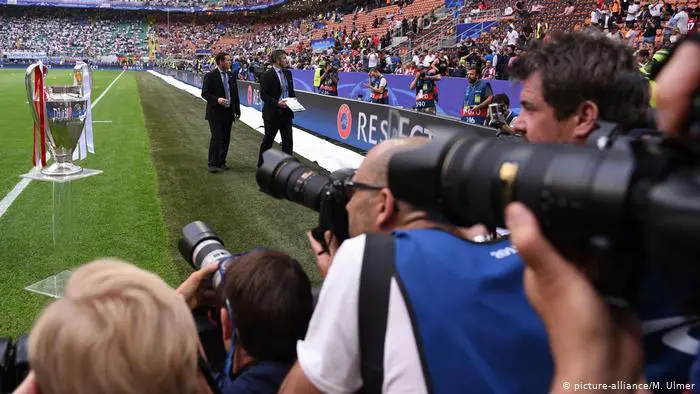
Blog: Tip and tricks in sports journalism
Have you ever wondered how sports journalists condense 90 minutes of action into 500 words on the back of a newspaper, or a page on a website? All those goals, fouls and (dare I say it) penalty shootouts?

The assumption might be that writers nap their way through a game, then hit their keyboard and hope for the best.
Not all of them and in fact, there’s a science to it. Sort of.
First of all, decide on the key news angle. Naturally enough, that will often be led by the scoreline – but not always. A major injury might take precedence, or even a dodgy VAR decision. Basically, the bit people want to read about.
Put yourself in the shoes of someone who has just watched the game – what will they want to know about the last 90 minutes? What sticks in the memory?
So now you’ve got your storyline – what next? A good intro is the most important part of a story. Think of it like an information triangle, with the key facts at the top and the rest flowing from there.
Ask yourself – Who? What? Where? When? A 2-0 win for England becomes (on a basic level): “England beat Germany 2-0 at Wembley on Tuesday night to take top spot in Group C of the European Championships.”
You can play with the structure of course, but the Four Ws should still be your guide. That might be: “Harry Kane’s second half goal helped England to victory against Germany at Wembley on Tuesday night.”
Once you’ve grabbed a reader’s attention, use the next few paragraphs to add more in-depth information. Mention the scorers or even the winner’s future prospects – so maybe England can now look forward to a second-round game against an easier team.
Assuming you’ve interviewed the manager or a significant player after the game, next you can add a few quotes. The best interviews are carried out immediately after the final whistle, before press officers can calm the gaffer down. Don’t be afraid to ask difficult questions, but always be respectful.
Just two or three paragraphs of quotes to sum up the game is sufficient at this stage.
Now it’s time to refer to your notes (you made some, right?) and describe what happened in a bit more detail. You’ve only got 500 words, so don’t stray from the facts about goals and key events.
If you’ve got space left after all that, finish off with a few quotes and you’re good to go.
For budding sports reporters, practice makes perfect. Start with reporting on a Sunday league or youth game and be polite. You never know who you’ll need to interview next time.
If you’re also taking photos, remember to ask permission and offer your images to the teams involved as an incentive. They’ll usually be grateful for the coverage.
Finally, always send your images, video and copy to your local newspaper. They might not use it this week, or even next week, but eventually they’ll have a gap to fill and you’ll have a foot in the door.
When your 500 words are on the back page (or on the website) all that effort will have been worth it.


